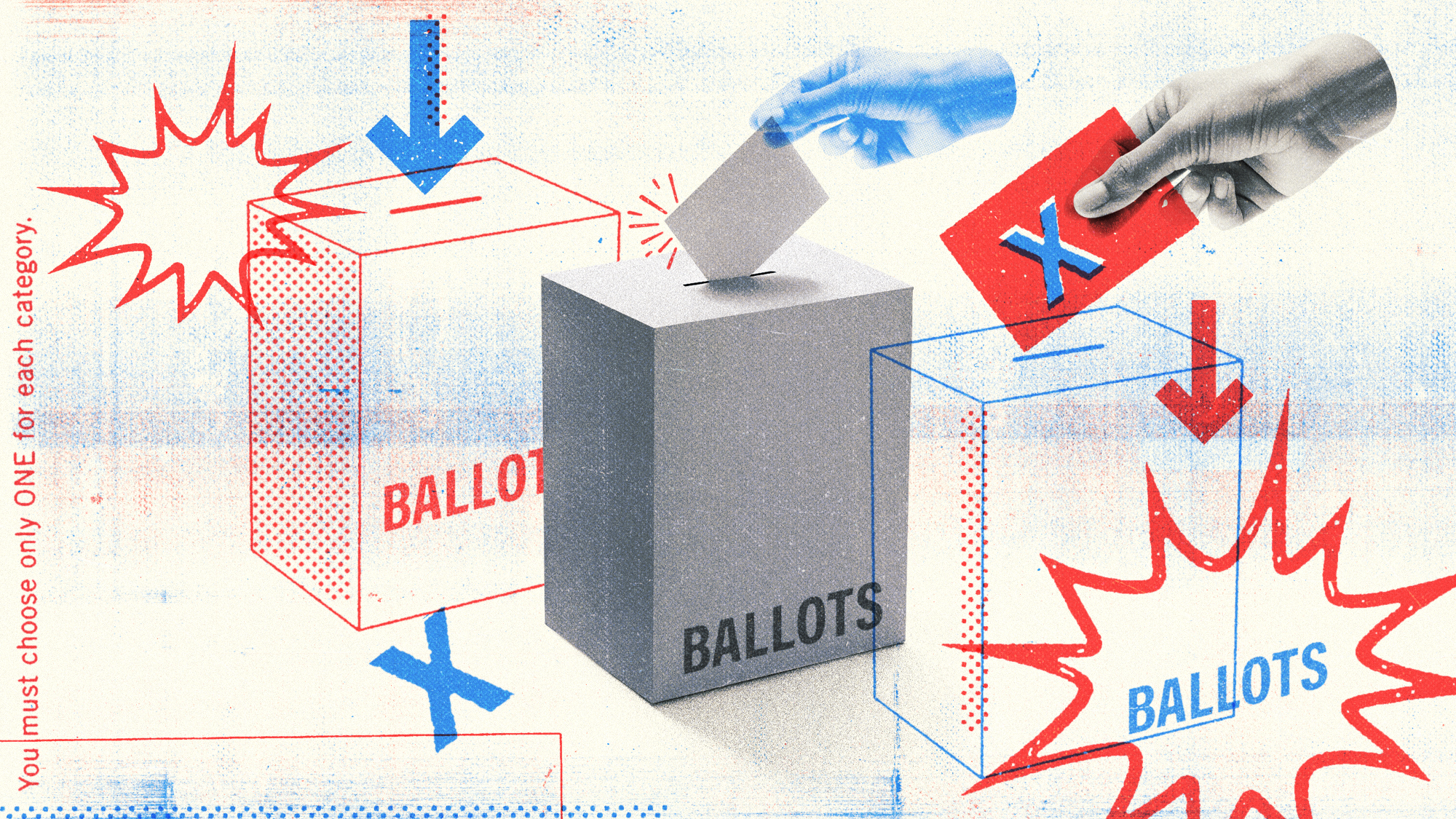UK general election: will there be any surprises?
Labour could 'struggle' to win dozens of key target seats as the party's stance on Gaza alienates some voters

A free daily email with the biggest news stories of the day – and the best features from TheWeek.com
You are now subscribed
Your newsletter sign-up was successful
Today's local election results and voter intention polls suggest the Conservative Party is heading for a general election wipeout – but victory for Labour is not yet guaranteed.
While Keir Starmer's party looks set to give the Tories "their worst drubbing in a century" when voters next go to the polls, said The Telegraph's Ben Riley-Smith, Labour "can be skittish" when it comes to electoral victory. "Share a coffee with frontbenchers or advisers and it is clear that the ghost of 1992 – and, to a lesser extent, 2015 – still haunts those nervous to believe in the polls."
Amid "internal mutterings" about party strategy, fears of potential "election shocks" continue to loom.
The Week
Escape your echo chamber. Get the facts behind the news, plus analysis from multiple perspectives.

Sign up for The Week's Free Newsletters
From our morning news briefing to a weekly Good News Newsletter, get the best of The Week delivered directly to your inbox.
From our morning news briefing to a weekly Good News Newsletter, get the best of The Week delivered directly to your inbox.
What did the commentators say?
The local election results are "bleak" for Rishi Sunak, said Steven Swinford in The Times. As of this morning, the Tories had "lost more than half of the councillors who were up for election", and Labour's by-election win in Blackpool South is "one of the biggest swings in postwar electoral history". Yet there are "some signs" that Labour's position on the Gaza conflict is "having an impact".
Nick Peel, leader of Bolton Metropolitan Borough Council, told The Bolton News that many South Asian voters had turned away from both Labour and the Tories "as a direct result of the ongoing humanitarian crisis in Palestine".
Experts have warned that Labour "could struggle to win as many as a dozen of its key targets", said The Guardian's Kiran Stacey, "and could even lose two of the seats it now holds", as the party's response to both Gaza and the climate crisis alienates growing groups of voters.
Although Labour "leads the way" in the local election results, said Sky News's elections analyst Professor Michael Thrasher, it is "having to share the headlines with seat gains made at the Conservatives' expense by the Liberal Democrats, Greens and a range of local independents".
A free daily email with the biggest news stories of the day – and the best features from TheWeek.com
The Lib Dems could also do better than expected in the Conservative heartlands in a national vote. The resignation of former PM Theresa May as MP for Maidenhead after 27 years leaves the previously safe Tory seat up for grabs – which the Lib Dems view as a "big opportunity for what could be a significant win", said the i news site.
What next?
The biggest general election shock may simply be the scale of the Conservative wipeout, said The Economist. Prediction models forecasting Tory defeat may "still be being too kind", as they don't "explicitly consider the potential for a jump in tactical voting". Previous wipeouts for the Conservatives such as those of 1906, 1945 and 1997 have been "at the hands of coordinated anti-Tory coalitions". And that could happen again as Labour becomes "more palatable to crossover voters" under Starmer than Jeremy Corbyn.
Providing another "dollop of the heebie jeebies" for the Conservatives is the performance of Reform UK in yesterday's votes, said Chris Mason on BBC Radio 4's "Today" programme. In the places where the Nigel Farage-founded party chose to stand, it "performed well", coming within fewer than 120 votes of beating the Conservatives to second place in the Blackpool South by-election.
"Support for Reform is real," said Sky's Thrasher, "and will hurt the Conservatives if played out at the next general election."
Sorcha Bradley is a writer at The Week and a regular on “The Week Unwrapped” podcast. She worked at The Week magazine for a year and a half before taking up her current role with the digital team, where she mostly covers UK current affairs and politics. Before joining The Week, Sorcha worked at slow-news start-up Tortoise Media. She has also written for Sky News, The Sunday Times, the London Evening Standard and Grazia magazine, among other publications. She has a master’s in newspaper journalism from City, University of London, where she specialised in political journalism.
-
 Bondi, Democrats clash over Epstein in hearing
Bondi, Democrats clash over Epstein in hearingSpeed Read Attorney General Pam Bondi ignored survivors of convicted sex offender Jeffrey Epstein and demanded that Democrats apologize to Trump
-
 Are Big Tech firms the new tobacco companies?
Are Big Tech firms the new tobacco companies?Today’s Big Question Trial will determine if Meta, YouTube designed addictive products
-
 El Paso airspace closure tied to FAA-Pentagon standoff
El Paso airspace closure tied to FAA-Pentagon standoffSpeed Read The closure in the Texas border city stemmed from disagreements between the Federal Aviation Administration and Pentagon officials over drone-related tests
-
 The Mandelson files: Labour Svengali’s parting gift to Starmer
The Mandelson files: Labour Svengali’s parting gift to StarmerThe Explainer Texts and emails about Mandelson’s appointment as US ambassador could fuel biggest political scandal ‘for a generation’
-
 Reforming the House of Lords
Reforming the House of LordsThe Explainer Keir Starmer’s government regards reform of the House of Lords as ‘long overdue and essential’
-
 How long can Keir Starmer last as Labour leader?
How long can Keir Starmer last as Labour leader?Today's Big Question Pathway to a coup ‘still unclear’ even as potential challengers begin manoeuvring into position
-
 Three consequences from the Jenrick defection
Three consequences from the Jenrick defectionThe Explainer Both Kemi Badenoch and Nigel Farage may claim victory, but Jenrick’s move has ‘all-but ended the chances of any deal to unite the British right’
-
 The high street: Britain’s next political battleground?
The high street: Britain’s next political battleground?In the Spotlight Mass closure of shops and influx of organised crime are fuelling voter anger, and offer an opening for Reform UK
-
 The MAGA civil war takes center stage at the Turning Point USA conference
The MAGA civil war takes center stage at the Turning Point USA conferenceIN THE SPOTLIGHT ‘Americafest 2025’ was a who’s who of right-wing heavyweights eager to settle scores and lay claim to the future of MAGA
-
 How cryptocurrency is changing politics
How cryptocurrency is changing politicsIn The Spotlight From electoral campaigns to government investments, crypto is everywhere and looks like it’s here to stay
-
 Nigel Farage’s £9mn windfall: will it smooth his path to power?
Nigel Farage’s £9mn windfall: will it smooth his path to power?In Depth The record donation has come amidst rumours of collaboration with the Conservatives and allegations of racism in Farage's school days